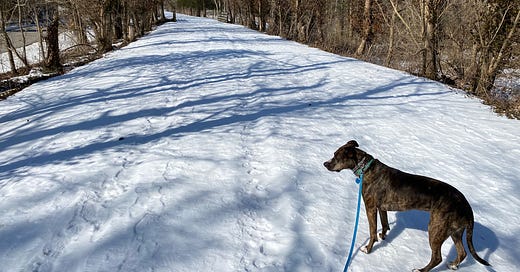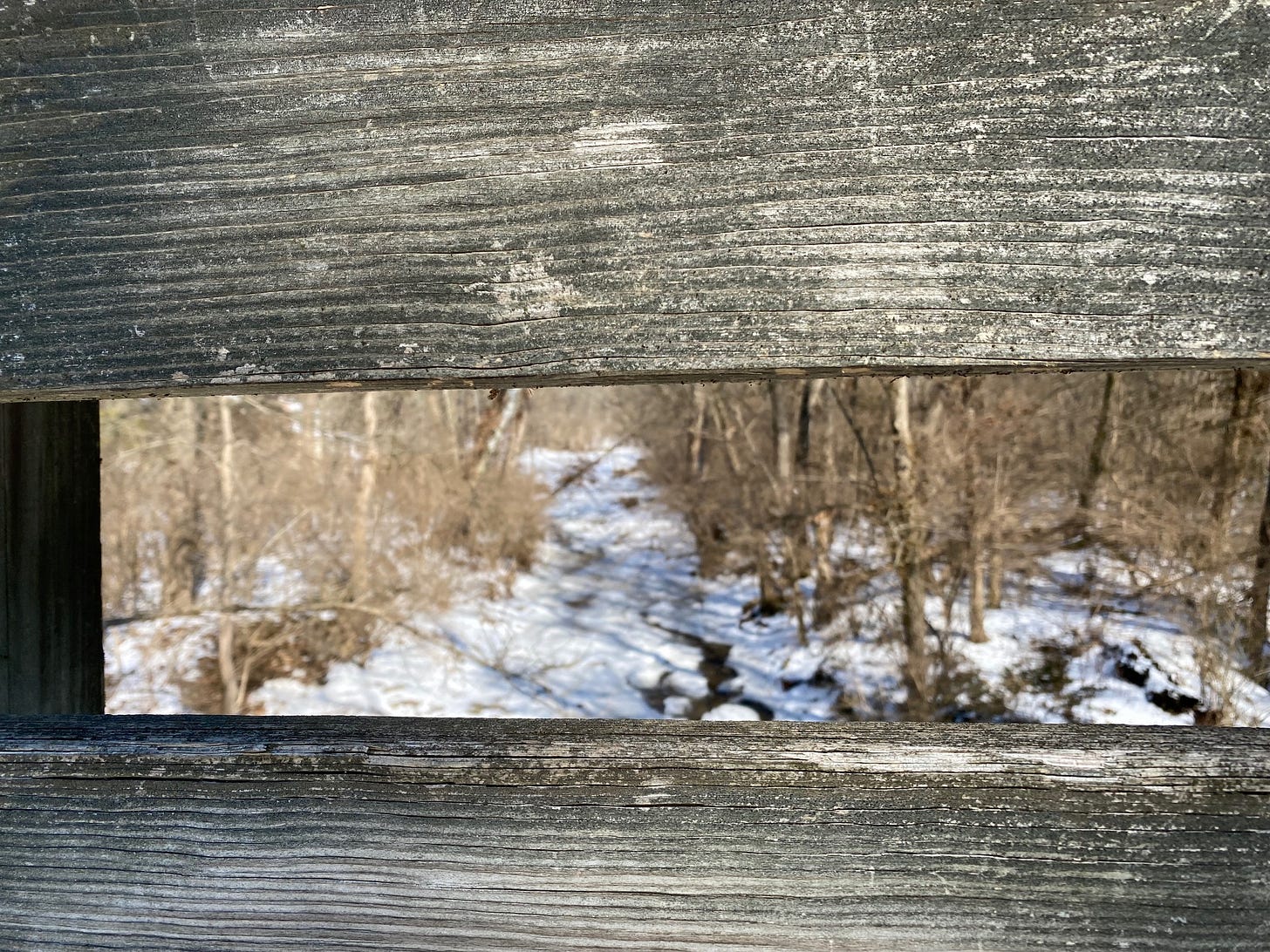Stuff I thought about while walking in the snow: Banning books, RNC resolutions, life with covid.
By Gary Abernathy
Stuff I thought about during a recent walk in the snow
Most days, barring complete weather disaster, I take our dog Paisley on a two mile walk on a great biking and walking trail near where Lora and I live. It’s fun to watch her scamper — she loves walks in all weather conditions except rain — and a good, quiet time to think.
During snowy walks each day this week, I thought about several things in the news. I was thinking one day about a thoughtful column I read by the Washington Post’s Katrina vanden Heuvel on the growing trend of school libraries succumbing to pressure to ban books. She wrote:
And incidents of this quieter version of book banning have recently spiked: A group of Texas school districts reported 75 attempts in the first four months of the 2021-2022 school year to censor children’s access to books. The number of attempts over the same period last year? Just one.
Many advocates for these bans claim they simply want to protect children from “vulgar, explicit material.” But no matter how well-intentioned, our best literary experts — librarians and authors themselves — have a clear message: This most recent wave of book banning is no less dangerous than book banning has been throughout history.
I agree. Book banning is a dangerous trend, although when it comes to public elementary, junior high and even high school libraries, I do think parents are within their rights to have input on what their children are exposed to, just as they do at home. But overall, it’s best to err on the side of a wide diversity of thought, opinion and subject matter, even when some of it might be considered offensive.
As the column goes on to point out:
Of course, some ideas in banned books aren’t just difficult; they’re downright dangerous or hateful. But in response to those concerns, the American Library Association cites philosopher John Stuart Mill: “The peculiar evil of silencing the expression of an opinion is, that it is robbing … those who dissent from the opinion, still more than those who hold it.” As Mill argues, the “collision” of ideas can make us wiser, but that requires people reading and engaging with ideas in the first place.
And, as I thought about all this while walking and admiring the snowy banks of the Little Miami River and coming upon a rustic old bridge where trains once traversed, I thought, “Why doesn’t the same logic apply to social media content?”
Think about the quote above about books in the context of people who get banned from social media for saying things that are deemed “downright dangerous or hateful,” as determined by decision-makers succumbing to pressure to de-platform certain voices: “The peculiar evil of silencing the expression of an opinion is, that it is robbing … those who dissent from the opinion, still more than those who hold it.”
Then I got distracted by Paisley suddenly chasing after a squirrel or a bird and practically yanking the leash out of my hand, and I started thinking about other things.
On another snowy walk this week, I started thinking about the Republican National Committee passing a resolution disciplining Liz Cheney and Adam Kinzinger for serving on the Jan. 6 committee, and the description of what happened on Jan. 6 as “legitimate political discourse.”
Later, the RNC tried to say that it was not referring to the actual incursion into the U.S. Capitol, but that’s ridiculous. The people at the RNC who wrote the resolution are smart enough to distinguish between the peaceful protest that happened before the riot, and the riot itself. The vagueness was counterproductive and set them up for justifiable ridicule.
I thought about how Mitch McConnell, the Senate Republican leader, came out later and said this: "The issue is whether or not the RNC should be sort of singling out members of our party who may have different views from the majority. That's not the job of the RNC.” As for calling the Jan. 6 riot “legitimate political discourse,” McConnell said, “We all were here; we saw what happened. It was a violent insurrection for the purpose of trying to prevent the peaceful transfer of power after a legitimately certified election from one administration to the next. That's what it was."
I was thinking as I walked, “Maybe the dam is starting to break.” By that I mean that Republicans in Congress who for whatever reason seem to shake in their boots at the thought of criticizing Donald Trump or the Jan. 6 rioters will maybe begin to stand up for themselves. While McConnell initially criticized Trump and called out the riot for what it was, he has since seemed to back off. But his comments after the RNC resolution were a return to his initial reaction.
And then House GOP leader Kevin McCarthy, after hem-hawing around for a while, was forced to weigh in more directly. McCarthy wasn’t as bold or as direct as McConnell. But when asked whether McConnell’s description of Jan. 6 as a violent insurrection was accurate, McCarthy said, “No one would disagree with that.” For McCarthy, that was really going out on a limb.
And then I thought about how I had already walked past a couple of piles of dog poop and how annoying it is that there are dog owners who don’t pick up after their dogs, despite signs along the path frequently reminding people to do that. Some people and their dogs are special, of course, and don’t have to follow the rules.
On another walk this week, I started thinking about how so many cities and states across the country were beginning to drop mask mandates and other covid restrictions, not because it had suddenly become safer to do so, but because, they said, they were just tired of it, and ready to get back to normal. And I thought about the difference between those of us who believed from the start that we never should have veered so far away from normal in the first place compared to those who took two years to finally get worn out enough to reach that point.
On a side note, yesterday I read this quote from Anthony Fauci, who many people look to for instructions on how to live, as he talked about local communities lifting restrictions:
“As we get out of the full-blown pandemic phase of covid-19, which we are certainly heading out of, these decisions will increasingly be made on a local level rather than centrally decided or mandated. There will also be more people making their own decisions on how they want to deal with the virus.”
Dear Dr. Fauci: Please be reminded that millions of Americans have been making our own decisions on how we want to deal with the virus from Day One. But it’s nice that you’ve finally given the green light to those who hang on your every directive to begin thinking for themselves.
This week’s walks have been good — cold but refreshing. A nice time to think, and solve all the problems of the world.
Talking RNC, Federal Reserve and crime on ‘NewsHour’
Last Friday I again filled in for David Brooks on the “PBS NewsHour” with Judy Woodruff and Jonathan Capehart. Rather than travel to Washington we did it by Skype, but it’s always better to be in the studio, as we usually do it. We discussed the RNC censuring Liz Cheney and Adam Kinzinger, the hearings for President Biden’s nominees to the Federal Reserve board, and rising crime rates — which I did not agree should be blamed on guns or gun laws. You can watch it at the link above.
Hoppy and I discuss the RNC, and GOP’s future

A few days after doing the “NewsHour,” Hoppy Kercheval invited me on “Talkline” to discuss the RNC actions, as well as Donald Trump’s hold on the GOP and the future of the party. It’s always enjoyable to do Hoppy’s show. He takes a lot of flak from Trump-supporting West Virginians for his position on Trump.
After the show, I heard from people saying that every time I talk about what Trump did after the election, I seem to be angrier about it. It’s true. I wish I could still support Trump, and it makes me angry that I can’t because I can’t forgive him for not accepting the election results, or his part in inciting the Jan. 6 riot. If he ever acknowledged he shouldn’t have done those things and apologized, it might be different. But we all know he’ll never do that.
Enjoy the show by clicking the image above.
Let’s accept that partisanship is a perk of winning
In my latest Washington Post piece, I argue that winning elections, whether it’s Republicans or Democrats, brings with it the right to exert a reasonable amount of partisanship in everything from drawing legislative districts to nominating justices to the Supreme Court. I wrote:
The announced retirement of Justice Stephen G. Breyer from the U.S. Supreme Court and the decennial process of drawing congressional districts present a golden opportunity to revisit an era when both sides in politics respected the spoils of victory — which includes flexing partisan muscles.
A few short decades ago, both parties acknowledged that winning brought benefits such as redrawing legislative districts, determining state election regulations, and making appointments to boards, commissions and courts. The losers complained, sure, but that was part of the dance.
From 1955 to 1995 — from the administrations of Dwight D. Eisenhower to Bill Clinton — Democrats controlled the House of Representatives. Somehow, this one-party domination prompted little anguish from reformers or the media. In most states, drawing state and federal legislative districts was recognized as a perk of winning. Some states have new laws designed to take the partisan fun out of it, but in places like Ohio and Michigan they have proved problematic.
I conclude that getting back to recognizing the right of winners to flex their partisan muscles could help return some civility to politics. You can read it here.
Sign up or share this newsletter
Please sign up to receive this newsletter directly into your inbox or, if you are already a subscriber and reading this by email, share with a friend using the convenient button below. Thank you.






Comment on banning books: the books that are sexually explicit in our school libraries IMHO need to go. Kids have not learned discernment like adults who can be more logical; kids are not able to do that! Sex, gender issues, again, Imho should be taught at home..